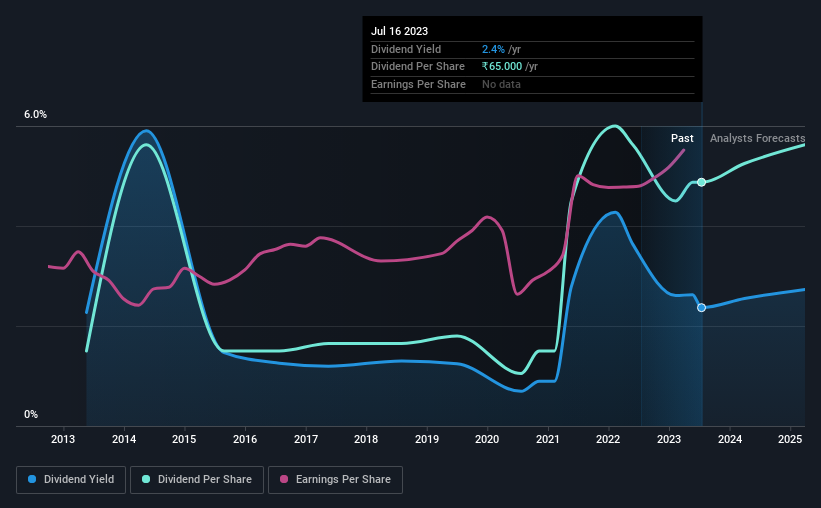Akzo Nobel India's (NSE:AKZOINDIA) Dividend Will Be Increased To ₹40.00

Akzo Nobel India Limited's (NSE:AKZOINDIA) dividend will be increasing from last year's payment of the same period to ₹40.00 on 2nd of September. This makes the dividend yield 2.4%, which is above the industry average.
See our latest analysis for Akzo Nobel India
Akzo Nobel India's Payment Has Solid Earnings Coverage
While it is great to have a strong dividend yield, we should also consider whether the payment is sustainable. Before making this announcement, Akzo Nobel India's was paying out quite a large proportion of earnings and 78% of free cash flows. This indicates that the company is more focused on returning cash to shareholders than growing the business, but it is still in a reasonable range to continue with.
Over the next year, EPS is forecast to expand by 60.8%. Under the assumption that the dividend will continue along recent trends, we think the payout ratio could be 63% which would be quite comfortable going to take the dividend forward.

Dividend Volatility
Although the company has a long dividend history, it has been cut at least once in the last 10 years. Since 2013, the annual payment back then was ₹20.00, compared to the most recent full-year payment of ₹65.00. This works out to be a compound annual growth rate (CAGR) of approximately 13% a year over that time. Akzo Nobel India has grown distributions at a rapid rate despite cutting the dividend at least once in the past. Companies that cut once often cut again, so we would be cautious about buying this stock solely for the dividend income.
Dividend Growth Could Be Constrained
Given that the dividend has been cut in the past, we need to check if earnings are growing and if that might lead to stronger dividends in the future. Akzo Nobel India has impressed us by growing EPS at 11% per year over the past five years. The payout ratio is very much on the higher end, which could mean that the growth rate will slow down in the future, and that could flow through to the dividend as well.
In Summary
Overall, we always like to see the dividend being raised, but we don't think Akzo Nobel India will make a great income stock. While we generally think the level of distributions are a bit high, we wouldn't rule it out as becoming a good dividend payer in the future as its earnings are growing healthily. We would probably look elsewhere for an income investment.
Companies possessing a stable dividend policy will likely enjoy greater investor interest than those suffering from a more inconsistent approach. Still, investors need to consider a host of other factors, apart from dividend payments, when analysing a company. For example, we've picked out 1 warning sign for Akzo Nobel India that investors should know about before committing capital to this stock. If you are a dividend investor, you might also want to look at our curated list of high yield dividend stocks.
If you're looking to trade Akzo Nobel India, open an account with the lowest-cost platform trusted by professionals, Interactive Brokers.
With clients in over 200 countries and territories, and access to 160 markets, IBKR lets you trade stocks, options, futures, forex, bonds and funds from a single integrated account.
Enjoy no hidden fees, no account minimums, and FX conversion rates as low as 0.03%, far better than what most brokers offer.
Sponsored ContentNew: Manage All Your Stock Portfolios in One Place
We've created the ultimate portfolio companion for stock investors, and it's free.
• Connect an unlimited number of Portfolios and see your total in one currency
• Be alerted to new Warning Signs or Risks via email or mobile
• Track the Fair Value of your stocks
Have feedback on this article? Concerned about the content? Get in touch with us directly. Alternatively, email editorial-team (at) simplywallst.com.
This article by Simply Wall St is general in nature. We provide commentary based on historical data and analyst forecasts only using an unbiased methodology and our articles are not intended to be financial advice. It does not constitute a recommendation to buy or sell any stock, and does not take account of your objectives, or your financial situation. We aim to bring you long-term focused analysis driven by fundamental data. Note that our analysis may not factor in the latest price-sensitive company announcements or qualitative material. Simply Wall St has no position in any stocks mentioned.
About NSEI:AKZOINDIA
Akzo Nobel India
Manufactures, distributes, and sells paints and coatings in India and internationally.
Flawless balance sheet with proven track record.
Similar Companies
Market Insights
Community Narratives



